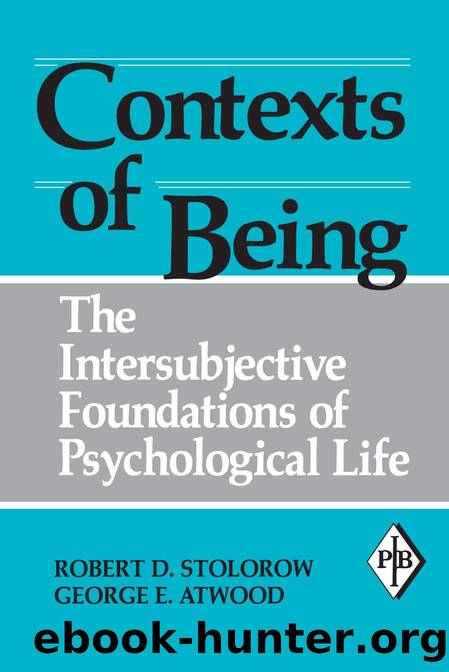Contexts of Being: The Intersubjective Foundations of Psychological Life (Psychoanalytic Inquiry Book Series) by Robert D. Stolorow & George E. Atwood

Author:Robert D. Stolorow & George E. Atwood [Stolorow, Robert D.]
Language: eng
Format: epub
ISBN: 9781317771463
Publisher: Taylor and Francis
Published: 2014-05-21T21:00:00+00:00
Discussion
The case of Jessica is a particularly clear example of derailment of the developmental process of self-differentiation-the evolving sense of being a distinct center of affective experience and personal agency, with individualized aims and goals. In an earlier work (Stolorow et al., 1987), it was proposed that specific, maturationally evolving selfobject experiences are necessary for facilitating, consolidating, expanding, and sustaining the development of differentiated selfhood during the entire life cycle. This developmental progression becomes disrupted when the requisite selfobject experiences needed to support the child's self-differentiating processes are absent or unsteady.
Derailment of the self-differentiation process occurs in an intersubjective situation in which central affect states associated with the development of individualized selfhood are consistently not responded to or are actively rejected. A fundamental psychic conflict thereby becomes enduringly established between the requirement that one's developmental course must conform to the emotional needs of caregivers and the inner imperative that its evolution be firmly rooted in a vitalizing affective core of one's own. As one of several possible outcomes of this basic conflict, the child may be compelled to abandon or severely compromise central affective strivings in order to maintain indispensable ties. As seen in the case of Jessica, this is the path of submission and chronic depression.
It will be recalled that a central theme in the transference in the early weeks of treatment was Jessica's belief that she had to mold herself to whatever the therapist needed her to be in order to maintain the therapeutic relationship. Moreover, Jessica experienced a profound sense of badness whenever she felt or did something that was not in harmony with what she thought the therapist required of her. Analysis of this transference paradigm produced a host of early memories in which the patient's mother would become injured, enraged, and attacking whenever her daughter's states of mind or behavior failed to conform to the mother's needs.
Other memories seemed to show quite clearly that the mother experienced attending to Jessica's emotional states and needs as an odious burden, particularly when Jessica was very small, and that her father was virtually unavailable as an alternate source of caregiving functions, Furthermore, her mother's many long absences, during which her contacts with Jessica were irregular and her return home unknown, left Jessica with a sense that her emotional importance to her mother was negligible and that the bond between them was quite tenuous. Jessica attempted to maintain this fragile tie by trying to be exactly the child her mother wished her to be, at the expense of her own affectivity and distinctness. Thus, Jessica's self-differentiating processes were already seriously compromised quite early in her relationship with her mother, establishing a pattern of self-subjugation and compliance with the requirements of others. It was with this preestablished organizing principle-self-surrender as the price for maintaining vital ties-that she entered the critical phase of her development ushered in by her brother's fatal illness. This invariant organizing principle set the stage for the pathological introjection that formed the basis of her chronic suicidality.
Download
This site does not store any files on its server. We only index and link to content provided by other sites. Please contact the content providers to delete copyright contents if any and email us, we'll remove relevant links or contents immediately.
Rewire Your Anxious Brain by Catherine M. Pittman(17590)
Talking to Strangers by Malcolm Gladwell(11880)
The Art of Thinking Clearly by Rolf Dobelli(8845)
Mindhunter: Inside the FBI's Elite Serial Crime Unit by John E. Douglas & Mark Olshaker(7835)
Becoming Supernatural by Dr. Joe Dispenza(7107)
Change Your Questions, Change Your Life by Marilee Adams(6642)
The Road Less Traveled by M. Scott Peck(6636)
Nudge - Improving Decisions about Health, Wealth, and Happiness by Thaler Sunstein(6634)
The Lost Art of Listening by Michael P. Nichols(6474)
Enlightenment Now: The Case for Reason, Science, Humanism, and Progress by Steven Pinker(6407)
Win Bigly by Scott Adams(6313)
Mastermind: How to Think Like Sherlock Holmes by Maria Konnikova(6236)
The Way of Zen by Alan W. Watts(5800)
Daring Greatly by Brene Brown(5643)
Grit by Angela Duckworth(4738)
Big Magic: Creative Living Beyond Fear by Elizabeth Gilbert(4723)
Men In Love by Nancy Friday(4327)
Flow by Mihaly Csikszentmihalyi(4053)
The Four Tendencies by Gretchen Rubin(4024)
